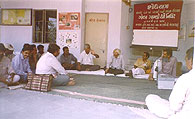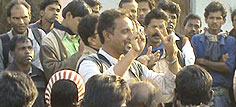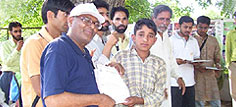|
Sristi Products
Technology

|
 |
|
SRISTI INNOVATIONS - The Brain Child of SRISTI
 SRISTI INNOVATIONS, is a Non Profitable Company set up with the objective of strengthening the capacity of grassroots inventors, innovators and ecopreneurs in the area of conserving biodiversity and developing eco-friendly solution to local problems is engaged inter alia in the area documentation, experimentation, search, development and diffusion of sustainable technologies and institutions.
SRISTI INNOVATIONS possesses requisite information and has developed many herbal formulations, the use of which is expected to cure certain diseases suffered by human being, animals and agricultural crops - to protect it from diseases as well as pest attack and has developed/is in the process of developing Herbal Medicines / Herbal Formulations / certain specific compounds and commercial products made by using such knowledge and information gathered in the process. The benefits so generated will be used for sharing benefits not only with the knowledge holders whose insights are used in the development of the drug but also with others for conservation of biodiversity, augmentation of creative and innovative spirit of people and pursue research on the related subjects.
About Sristi
 |
|
 |
SRISTI (Society for Research and
Initiatives for Sustainable Technologies and Institutions), which means
creation in Sanskrit, was born in 1993 as a result of the felt need for an
institutional support to the activities of the Honey Bee Network. Based in
Ahmedabad, Gujarat, SRISTI is a registered charitable organization under
Bombay Public Trust Act, 1950. The organization is also registered under
Sec. 80 of Income Tax Act, 1961 and Foreign Contribution Regulation Act,
1976.
SRISTI was set up to provide organizational, intellectual and logistics
support to the Honey Bee Network. The primary objectives while setting up
the organization were: systematically documenting, disseminating and
developing grassroots green innovations, providing intellectual property
rights protection to grassroots innovators, working on the in situ and ex
situ conservation of local biodiversity, and providing venture support to
grassroots innovators. SRISTI manages the Honey Bee database of innovations,
and supports the publication of the Network's newsletter in three languages,
English, Hindi and Gujarati.
Lately SRISTI has being focusing on more concerted ways of hitherto
neglected domains like women's knowledge systems, value addition through a
natural product laboratory, using ICT to establish knowledge network,
connecting innovators, traditional knowledge holders with the centres of
formal excellence, entrepreneurs etc and innovations in education.
|
|
 |
WHAT WE BELIEVE IN
Honey Bee Philosophy
Honey Bee signifies a philosophy of discourses, which is fair, authentic
and accountable. It advocates people to people learning. The ethics of
knowledge extraction, its documentation, dissemination and their abstraction
into theories or technologies is the central concern of the Honey Bee
Network.
Despite all claims about participatory research and action, seldom have we
provided opportunity to creative innovators and traditional knowledge
holders to do research themselves as well as in partnership or by hiring
formal researchers. The institutional scientists have often paid lip service
to the cause of collegial partnership with the local communities and people.
An evidence of this problem is that almost no research council in developed
or developing country requires local knowledge providers in villages to be
acknowledged by their name and address. Most institutions do not insist on
their prior informed consent, although situation is changing in some of the
developed countries but in developing countries, the lack of accountability
is almost universal. The issue of local communities and innovators being
enabled to hire institutional scientists and fire them, if they don’t
deliver is in the realm of speculation. Honey Bee Network, started sixteen
years ago tried to reverse this logic. There were four principles, which we
learnt from the life of honeybee.
- Just as flowers don’t complain when their nectar or pollen are
taken away, people should not complain when their knowledge is
documented by outsiders. They should be acknowledged by their name and
address and their intellectual property rights should be respected.
- The bees perform a very important function of cross-pollination
thereby enriching diversity and keeping the nature’s cycle on.
Unless we communicate in local languages and in a manner that people can
understand, people to people linkages will not be established. We should
ensure that opportunities for people to people learning are given first
priority in any social knowledge exchange.
- Whenever any wealth is generated by disseminating the knowledge
through commercial or non-commercial channel after adding value or
without it, a fair share should go back to the people whose knowledge has
made that wealth possible.
- Before disseminating people’s knowledge or bringing it in public
domain, their prior informed consent should be taken.
Honey Bee encourages collaborators to initiate local language versions
of Honey Bee Newsletter, so that people to people learning across the
barriers of language, culture and region can be facilitated. With the help
of the regional collaborators of Honey Bee, six regional language versions
have evolved, which actually facilitate the process of cross-cultural
exchange of knowledge and mutual learning among communities. These are:
Tamil (Nam Vali Velanmai), Kannada (Hittalagida), Gujarati (Loksarvani),
Hindi (Sujh-Bujh Aas Paas Ki), Malyalam (Ini Karshakan Samsankiiatte), and
Oriya (Aama Akha Pakha). Invitations have been received by SRISTI to
initiate similar network in Africa and other parts of the world.
Honey Bee, is like a Knowledge Centre/Network which pools the solutions
developed by people across the world in different sectors and links, not
just the people, but also the formal and informal scientists, policy makers,
innovators, green entrepreneurs and educationists.
Philosophy of Seven Es
SRISTI works on the principle that a synthesis of seven Es, i.e.,
Excellence, Equity, Environment, Efficiency, Ethics, Empathy and Education.
These provide the right chemistry for societies seeped in mediocrity to get
over their inertia and move towards a compassionate, creative, competitive
as well as collaborative society.
THE VISION STATEMENT
A framework for creating an inventive
ethic at grassroots level and forging links between excellence in formal and
informal Science through Honey Bee Network.
Note on the vision statement
Global competitiveness of any society hinges basically on its ability to
incorporate the spirit of excellence at all levels of society. A chain is as
strong as its weakest link. To widen the decision making options of
knowledge rich economically disadvantaged communities and individuals; one
needs to build upon their experimental and innovative spirit. Only then the
whole chain can be strong. Honey Bee Network of grassroots innovators has
proved that technological and institutional innovations developed by
individuals and communities can provide a new way of thinking about
conservation of diversity, generation of sustainable alternatives for
natural resource management through self supporting viable economic and
non-economic options, and augmenting self reliant livelihood strategies.
It is a model of poverty alleviation and conservation of natural resources
which builds upon particular resources in which poor people are often rich
i.e. their knowledge. In many cases, the insights learnt from local
innovations can even extend the frontiers of modern science. In the case of
herbal medicine, the studies have shown that as many as seventy four percent
of the human plant derived drugs are used for the same purpose for which
local communities and tribal people use these plants (Farnsworth, 1981).
What modern science did was only to make the method of extraction,
formulation, storage or delivery more efficient, or in some cases generate a
synthetic analogue of the active compounds. It is a different matter that in
almost no case, modern private or other public sector organizations have
ever shared any gain from this knowledge with the local communities or
individual innovators. The experience of TBGRI is an exception. Honey Bee
Network was started ten years ago to correct asymmetry in power
relationships between formal and informal sectors of science, technology and
economic enterprises. Honey Bee Network believes in protection of
intellectual property rights of local communities as well as individuals and
has been pleading for that much before the issue of patenting was being
discussed widely in the country. Honey Bee does what we intellectuals and
other public professionals often fail to do. It connects flower to flower
and takes away their nectar and pollen without making them to complain. The
cross pollination of ideas among local communities is possible only if we
share our research findings in local language that communities can
understand. Similarly, when we collect knowledge from people,
we should not make it anonymous knowledge. The providers should be
acknowledged and their IPRs should be protected. Further, if we get any
material rewards, gains or any other form of income from commercialization,
diffusion or publication of this knowledge, we must share part of the gains
with knowledge providers and their communities.
It is this spirit which guides the activities of the voluntary
organization, SRISTI (Society for Research and Initiatives for Sustainable
Technologies and Institutions) set up in 1993 to support and strengthen the
Honey Bee Network - a voluntary informal network of creative people, policy
makers, scientists, NGOs and other professionals interested in augmenting
grassroots innovations. The Honey Bee Network tries to:
- Provide a peer groups of farmers, artisans, scientists, academics
across language, culture and regional boundaries to nurture, critique
and encourage innovative experimentation.
- Break the nexus between the regions of high biodiversity and high
poverty endowed with poor public as well as private infrastructure.
- Provide access to information that can help improve productivity
without increasing cost using other farmers' innovations. Most of the
grassroots innovators do not have access to relevant information, which
cripples their ability to raise resources and explore opportunities in
different markets. Thus poor demand of ecological and technological
skill as well as their eco- friendly products forces them to become "unskilled
labourers" in the urban houses and markets; galvanize existing
institutions and community structures to inspire and sustain the
curiosity and spirit of younger generation to pursue the path of
experimentation and excellence in local eco-enterprises and natural
resource management.
- Resolve an ethical dilemma about sharing and protecting traditional
as well as contemporary knowledge of individuals and communities evolved
through conscious efforts but guided by different value systems without
keeping people poor. The fact that we have not found many young healers
indicates that younger generation does not find the career of healer or
herbalist worth pursuing when it entails a life of penury though with a
lot of goodwill in the community.
- Generate a system for rewarding and providing incentives to the
innovative individuals as well communities under the provision of
several international and national agreements like Convention on
Biological Diversity (Art 8(J)), International Convention to Combat
Desertification (Art 16) etc.
Response to these challenges has been organised through an iterative
and interactive process for nurturing and encouraging creativity and
innovations of people at grassroots. SRISTI has achieved some success on
various fronts in addressing various challenges described above (Please
see SRISTI report in Annexure). We greatly acknowledge the support
provided by various agencies like Swiss Development Cooperation (1981-
1990) , International Development Research Center (IDRC) Canada, PEW
Conservation Scholar Programme (award to Professor Gupta), Swedish
Society for Nature and Conservation, MacArthur Foundation, University of
Gothenburg, FAO /FTPP Programme and Global Environment Facility ( GEF)
and UNDP supported project on Dryland Biodiversity in North Gujarat
being implemented on behalf of Ministry of Environment and Forestry and
most importantly the grassroots innovators themselves (Please see
details of the financial resource received by SRISTI, and audited
balance sheets of last three years in Annexure II). However, we
strongly feel that the real indicator of success will be when these
activities can be sustained on their own through collective efforts of
local innovators, investors and entrepreneurs in the near future. We are
very conscious of the need to transform these activities from the "project
mode" to a "self sustained polycentric movement". We hope
that NISSAT will help steer this proposal for support from various
public agencies to make transition towards the "local self
governing sustainable institutional network" possible.
GOALS
SRISTI has set the following goals for
itself to promote and celebrate grassroots creativity and traditional
knowledge.
- To expand space in society for building upon sustainable
technological, institutional and educational initiatives and innovations
at the grassroots with special focus on women's knowledge.
- To document, analyse and disseminate innovations developed by people
themselves.
- To validate and add value to local innovations through experiments
(on farm and on-station) and laboratory research for generating
nature-friendly sustainable technologies.
- To conserve local biodiversity through in-situ and ex-situ gene banks
managed by local people.
- To protect the intellectual property rights of grassroots innovators
and to generate incentive models for recognising, respecting and
rewarding grassroots creativity and associated ethical values and norms.
- To provide venture support to grassroots innovators to scale up
products and services based on grassroots innovations through commercial
or non-commercial channels.
- To embed the insights learnt from grassroots innovations in the
formal educational system in order to expand the conceptual and
cognitive space available to these innovations.
|
 SRISTI INNOVATIONS, is a Non Profitable Company set up with the objective of strengthening the capacity of grassroots inventors, innovators and ecopreneurs in the area of conserving biodiversity and developing eco-friendly solution to local problems is engaged inter alia in the area documentation, experimentation, search, development and diffusion of sustainable technologies and institutions.
SRISTI INNOVATIONS, is a Non Profitable Company set up with the objective of strengthening the capacity of grassroots inventors, innovators and ecopreneurs in the area of conserving biodiversity and developing eco-friendly solution to local problems is engaged inter alia in the area documentation, experimentation, search, development and diffusion of sustainable technologies and institutions.









